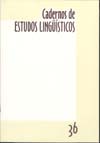Resumo
Tem sido proposto na literatura que o “problema lógico da aquisição da linguagem” para o aprendiz de L2 é o mesmo que o aprendiz de L1 enfrenta (White 1982, 1995).Este trabalho é uma análise do problema. Primeiramente, mostro as várias posições na literatura sobre a aquisição de L2. Em seguida, descrevo os resultados de uma pesquisa em andamento (Cyrino, 1996) cujo objetivo é investigar a acessibilidade da Gramática Universal para aprendiz de L2.Referências
ADJEMIAN, C. “On the nature of interlanguage systems” Language learning 26 (2): 207-320, 1976.
ASHER, J.T. & B.S. PRINCE. “The learning strategy of the total physical response: some age differences”. Child Development, 38:1219-1227. 1967.
BICKERTON, D. Language and species Chicago, Chicago University Press, 1990.
BLEY-VROMAN, R. “What is the logical problem of foreign language learning?” In: S. Gass & J. Schachter (orgs.) Linguistic Perspective on Second Language Acquisition. Cambridge, Cambridge U Press, 1989.
CHOMSKY, N. Lectures on Government and Binding Dordrecht, Foris, 1981.
______. Knowledge of language: its nature, origin and use Cambridge, MIT Press, 1986.
______. A miminalist program, ms. MIT, 1992.
CYRINO, S.M.L. The Pro-Drop Parameter and Second Language Acquisition, dissertação de mestrado, University of Iowa, EUA, 1986.
______. O objeto nulo no português do Brasil: um estudo sintático-diacrônico, tese de doutorado, UNICAMP, 1994.
______. Aquisição de Língua Estrangeira e Gramática Universal - gramática núcleo vs. gramática periférica e o problema da integralização na aquisição, pesquisa cadastrada na Universidade Estadual de Londrina, 1996.
COOK, V. “Cognitive processes in second language learning” International Review of Applied Linguistics 15 (1): 1-20. 1977.
ELLIS, N. “Consciousness in second language acquisition: a review of field studies and laboratory experiments” Language awareness 4 (3): 123-146. 1995.
FELIX, S. Cognition and Language Growth. Dordrecht, Foris, 1987.
FLYNN, S. “Similarities and differences between first and second language acquisition: setting the parameters of Universal Grammar” In: D.R. Rogers & J.A. Sloboda (orgs.) The Acquisition of Symbolic Skills. New York, Plenum. 1983.
HAEGEMAN, L. “Register variation in English: some theoretical observations”, Journal of English Linguistics 20 (2): 230-248.
KRASHEN, S. Principles and Practice in Second Language Acquisition. Oxford, Pergamon, 1982.
LENNEBERG, E. Biological Foundations of Language. New York, Wiley. 1967.
MASSAM, D. & ROBERGE, Y. “Recipe context null objects in English”, Linguistic Inquiry 20: 134-139.
PARADIS, M. “Neurolinguistic aspects of implicit and explicit memory: implications for bilingualism and SLA” in N.Ellis (org) Implicit and Explicit Learning of Languages London, Academic Press, 1995.
PINKER, S. The Language Instinct. New York, W. Morrow, 1994.
QUIRK, R. et al. A comprehensive grammar of the English language. London: Longman, 1985.
SCHACHTER, J. “Second Language Acquisition and its Relationship to Universal Grammar”, Applied Linguistics 9 (3): 219-235. 1988.
WHITE, L. Grammatical Theory and Language Acquisition. Dordrecht, Foris, 1982.
______. Universal Grammar and Second Language Acquisition. Philadelphia, John Benjamins, 1995.
WILLIAMS, E. “Argument structure and morphology”. The linguistic review 1: 82-144. 1981.
ZOBL, H. “Word order typology, lexical government, and the prediction of multiple, graded effects in L2 word order”. Language Learning 36 (2): 159-183. 1986.
______. “Converging evidence for the ‘acquisition-learning’ distinction”, Applied Linguistics 16 (1): 35-56. 1995.
O periódico Cadernos de Estudos Linguísticos utiliza a licença do Creative Commons (CC), preservando assim, a integridade dos artigos em ambiente de acesso aberto.

